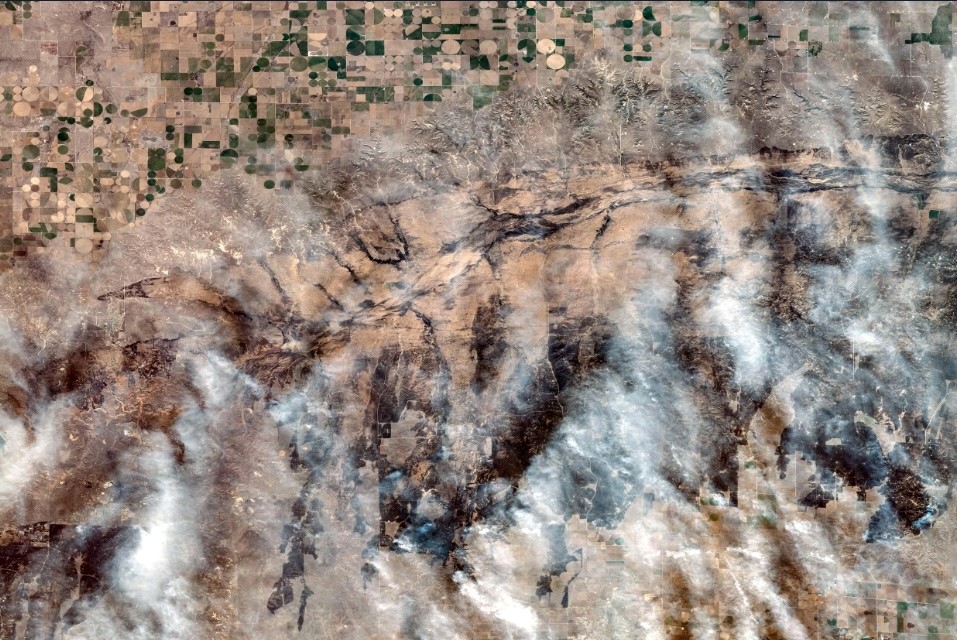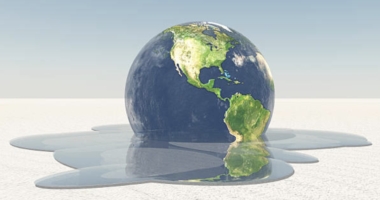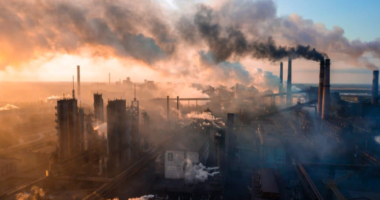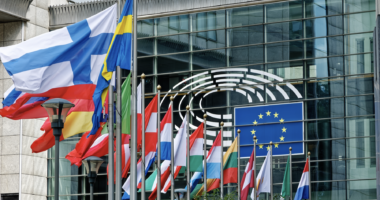Climate, Health and Equity Brief
Historic winter heat and wildfires
March 11, 2024
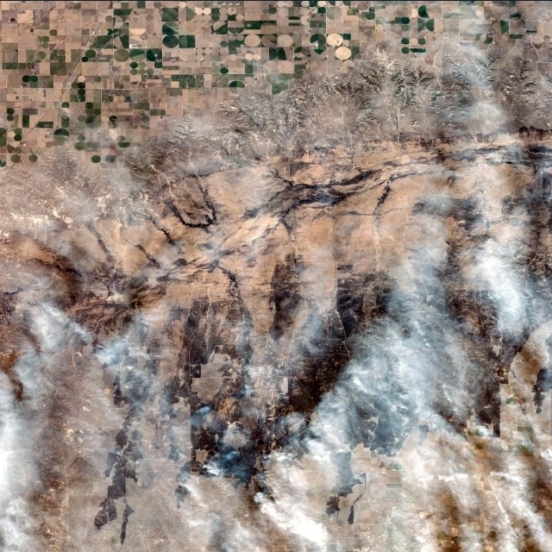
The Climate, Health & Equity Brief is GMMB’s take on the latest news on the current impacts of climate change. If you haven’t subscribed yet, you can do so by clicking here.
Hot Topic: Winter is fading. The most catastrophic wildfire event in Texas history roared across the state’s panhandle over the last two weeks, continuing the trend of climate-fueled devastation during winter. The wildfires have killed two people, scorched more than 1.2 million acres, destroyed 500 homes, killed at least 7,000 head of cattle, and prompted Governor Greg Abbott (R) to declare a 60-county state of emergency and seek federal aid.
Early indicators suggest that a fallen power line ignited the Smokehouse Creek fire, the largest in state history. But scientists say climate change is setting the stage for fast-spreading, destructive wildfires unmatched in their ferocity and spread. Temperatures in the Panhandle ranged from 20-30°F above normal the day the fire started—and thanks to a heating climate, Texas now experiences 32 more days of “fire weather” annually than it did in the 1970s—hot, dry conditions that make land and vegetation much more combustible and fires much more difficult to contain.
Unfortunately, Texas is not the only state that endured exceptional heat conditions in recent weeks. In what is being called one of the most extreme heat events in North American history, a heat wave shattered monthly high-temperature records in more than 130 cities and towns across the U.S., in some cases reaching temperatures 40°F above average for February.
Despite the onslaught of devastation from extreme weather, a flurry of announcements this week show some progress. The SEC approved groundbreaking—if watered down—rules requiring public companies to disclose their greenhouse gas emissions. A new report shows that the Inflation Reduction Act and Bipartisan Infrastructure Law spurred a 38% increase in clean energy and transportation investments in 2023. The EU voted overwhelmingly to criminalize and imprison perpetrators of severe environmental damage—including corporate CEOs and members of their boards. And a newly launched satellite tracking methane leaks will provide governments, researchers and the general public with free data on the leaks, opening the lid on usually private data kept under wraps by the oil and gas industry.
Human Health
A new study has found that extreme temperature exposure increases the risk of preterm birth by 60%, which could lead to lifelong complications for millions of children globally. (Cosmos Magazine)
A new study published in the journal Nature Medicine found that areas in the U.S. hit the hardest by extreme weather events experience mortality rates as much as 3.8 times higher than nearby areas. (TIME)
Planetary Health
Fueled by dry conditions, high winds, and temperatures up to 30°F above normal for February, the most destructive wildfire crisis in Texas history prompted Governor Greg Abbott (R) to declare a 60-county state of emergency and seek federal aid. (Grist)
In what is being called one of the most extreme heat events in North American history, last week’s winter heat wave shattered monthly high-temperature records in more than 130 cities and towns across the U.S.—in some cases reaching temperatures 40°F above average for February. (Axios)
Climate change is causing major disruptions to the water cycle across the United States as patterns of runoff have shifted, glaciers have melted, and higher temperatures have dried out water supplies across the nation. (NBC)
Global carbon dioxide emissions reached a record high last year, with energy-related CO2 emissions rising by 1.1% globally, fueled by a drought-induced drop in hydroelectricity production and increased coal use and electricity demand in India and China that outweighed 50-year emissions lows in other advanced economies. (The Wall Street Journal)
Equity
A new analysis of 33 state applications for Solar for All found that the $7 billion grant program established by the Inflation Reduction Act would create 2,917 megawatts of new solar-generation capacity, serve 711,068 low-income and disadvantaged households, and save them $2 billion over the next five years. (Canary Media)
Politics & Economy
The SEC approved groundbreaking new regulations requiring companies to disclose their emissions—a move that has prompted legal challenges from Republicans—but the regulations omitted Scope 3 emissions, those that companies are indirectly responsible for up and down their value chains. (Reuters)
A new Rhodium Group report found that investments in climate technologies such as green hydrogen, sustainable aviation fuel and carbon capture increased tenfold in 2023, largely due to the Inflation Reduction Act and Bipartisan Infrastructure Law. (Bloomberg)
The EU voted overwhelmingly to become the first international entity to criminalize acts committed with the knowledge that they will likely cause severe environmental damage—a “revolutionary” step that aims to end impunity for environmental criminals. (Euronews Green)
A new report found that the Philippines and the United States are the two countries taking the biggest financial hit from climate-driven floods and storms globally, facing annual losses of 3% and .38% of GDP, respectively—or $97 billion annually in the case of the United States. (Bloomberg)
A new study found that compared to a second Biden term, a second Trump presidency would lead to an extra 4 billion tons of CO2 emissions by 2030, dooming the Paris Agreement goal and increasing US emissions to approach those of the EU and Japan combined. (Axios)
The Supreme Court is hearing arguments on laws from Texas and Florida that aim to restrict social media companies’ content moderation, with experts warning that a ruling upholding these laws could hinder efforts to combat climate change by making it more challenging to control the spread of disinformation on social media platforms. (Inside Climate News)
Action
MethaneSAT, a newly launched satellite that can detect methane, will provide data on global methane leaks during fossil fuel production that will be freely available for government officials, researchers and the public, lending transparency to data traditionally kept confidential by the fossil fuel industry. (NPR)
Singapore announced plans to build the world’s largest ocean carbon dioxide removal facility by 2025, aiming to extract 4,000 tons of carbon dioxide every year and store it for at least 10,000 years. (TIME)
Life as We Know It
The Can-Am Crown International Sled Dog Race was canceled for the first time ever due to lack of snow, impacting hundreds of competitors, vendors, and the local Maine economy. (The New York Times)
Last-chance tourism—visiting places threatened by climate change before it’s too late—is on the rise, with some questioning whether visiting fragile environments only furthers their destruction, and others citing surveys showing a rise in environmental consciousness among visitors following their trips. (The New York Times)
Kicker
Just in time for the Oscars, a new “Bechdel test” has emerged to test how Hollywood is representing climate change in movies and on TV—and of the 13 Oscar-nominated movies this year, only “Barbie,” the latest “Mission Impossible” and “Nyad” passed the Climate Reality Check. (Los Angeles Times)
No matter how hard we try, fires are going to keep getting bigger, and the reason is clear. Climate is running the show in terms of what burns.”
– Park Williams, Lamont-Doherty Earth Observatory at Columbia University
The GMMB Climate, Health & Equity Brief would not be possible without the contributions of the larger GMMB team—Aaron Benavides, Stefana Hendronetto, Nikki Melamed, Sharde Olabanji and Marci Welford. Feedback on the Brief is welcome and encouraged and should be sent to [email protected].

